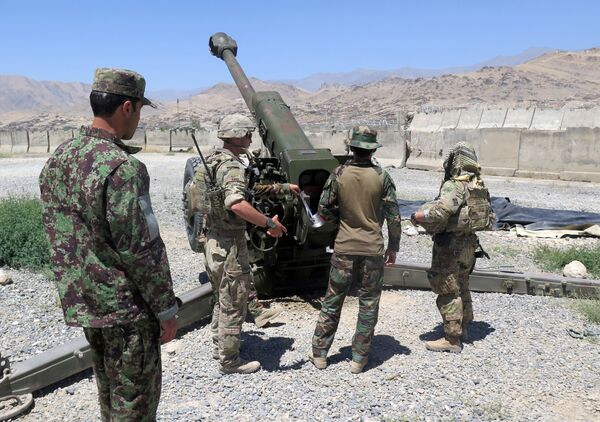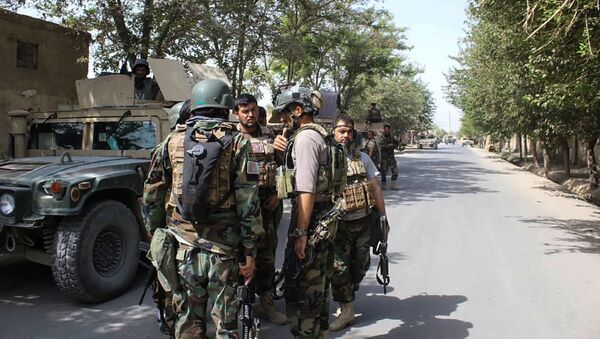The conflict has intensified in recent days in the wake of the US deal with the Taliban. Ten people were killed and 42 others were injured in a car bomb explosion in Kabul on Thursday, a day after Afghan air forces eliminated 26 Taliban militants in airstrikes in Ghazni.
On Monday, US special envoy Zalmay Khalilzad after talks with the Taliban in Qatar announced that a draft agreement had been reached that calls for Washington to withdraw 5,000 personnel from Afghanistan within the next 135 days, which would leave around 8,000 US government troops in the country.
Perpetual Conflict
The announcement came after nine rounds of talks between US and Taliban officials that began nearly a year ago. A framework understanding had been reached earlier this year that called for the extraction of all foreign forces from Afghan soil in exchange for Taliban assurances that the movement would not play host to terrorists.
US President Donald Trump told FOX News last week that the United States would always have an "intelligence" presence in Afghanistan. Meanwhile, according to the New York Times, White House advisers are considering expanding the CIA’s presence in the country to fill gaps left by the limited troop withdrawal, which would seem to contradict the spirit of the tentative agreement unveiled by Khalilzad.
Hence, some experts believe the recently announced accord in no way amounts to a significant breakthrough.
"Alone by itself, the withdrawal of 5,000 US troops will change nothing on the ground in Afghanistan in the immediate term. The war will go on", US Army War College national security affairs professor M. Chris Mason noted.
Moreover, Mason argued, considering the Taliban do not view the CIA/NDS and their paramilitary forces differently than regular troops, the proposed withdrawal would have to be seen as either a first incremental step or a "confidence-building" measure. In the meantime, he added, the insurgents will continue pushing to tighten their grip on Afghanistan on several fronts.
"The Taliban are intent on retaking complete political control of Afghanistan, and there is no chance whatsoever that they will integrate themselves into the existing political order, which they consider heretical and illegitimate", Mason explained. "They are slowly, glacially, taking control of the rural areas of Afghanistan, where at least 80 percent of the Afghan population lives. There is no ceasefire in this agreement as I understand it",
The Afghan presidential elections set for the end of September, he continued, if they happen are simply akin to "re-arranging the deck chairs on the Titanic". The national security professor pointed out that only one-third of eligible Afghan voters participated in the previous election and there is no reason to believe that will change.
"It is generally agreed by experts that the Taliban now control about 50 percent of the territory and population of Afghanistan, and that will naturally suppress turnout. In fact the current Afghan government today doesn't have any more popular support or legitimacy than the South Vietnamese government did in 1970", Mason said.

To put the situation in strategic perspective, the professor compared US, allied and Afghan government troop levels with those in South Vietnam, which was one-fourth the size of Afghanistan. At the peak of US engagement in Vietnam the United States had 535,000 personnel in the country, American allies had another 50,000, and the South Vietnamese government had about 1.6 million troops.
"In Afghanistan, after this drawdown we [the United States] will have approximately 1 percent of our Vietnam total, and our Allies about two percent of the overall allied Vietnam contribution", Mason said.
The Afghan National Army, meanwhile, has 80,000 men, the police 70,000, and various government-controlled militias about 50,000 for a total of about 200,000 personnel, he noted.
"In regard to men-under-arms fighting for the government, then, Afghanistan today has approximately 12 percent of the armed forces which the South Vietnamese government controlled - again with a territory 400% the size in total area to defend. Strictly in terms of military analysis, then, it is difficult to see how the eventual military outcome in Afghanistan will be an improvement over the outcome in South Vietnam", Mason concluded.
Perpetual US Presence
US President Barack Obama left some 8,400 troops in Afghanistan before leaving office almost three years ago. However, in 2017 the Pentagon - per a new accounting method - said there were actually 11,000 personnel on the ground. Trump later in 2017 authorized the deployment of roughly 3,000 troops - bringing the current total to 14,000.
Some experts have slammed Trump for claiming this is a peace deal considering he is leaving only a few thousand less than the number of troops he inherited in the first place.
University of Pittsburgh International Affairs Professor Michael Brenner pointed out the fact that Obama declared the war officially over in December 2014 at a White House ceremony while Trump, for his part, during his 2016 election campaign said he would get the United States out of Afghanistan.
And yet, here we are, and this latest deal with the Taliban does not get the United States any closer to that objective, he said.
"The latest Qatar draft agreement doesn’t really advance anything. The US has offered no timetable or no schedule for the troop drawdown. It maintains an 8,500 remnant force in the country", Brenner said.
Not to mention, Brenner added, the agreement does not address the large mercenary forces run by private contractors nor the thousands of CIA special operatives still in Afghanistan.
"Where and when will they talk… and about what? That’s left cloudy. Will there be a cease-fire? No. So Afghanistan will stay divided", the professor claimed.
The country’s fragmentation will sharpen, he continued, exacerbated by the fact that Daesh* in rivalry with al-Qaeda* (terrorist groups both banned in Russia) now has established a presence inside Afghanistan as well.
"All the entire Trump administration has done is to repeat an official pledge about al-Qaeda that they first made decades ago", Brenner concluded.
Views and opinions, expressed in the article are those of the speakers and do not necessarily reflect those of Sputnik.
*Daesh (also known as ISIS, IS, ISIL) and al-Qaeda are terrorist groups both banned in Russia



